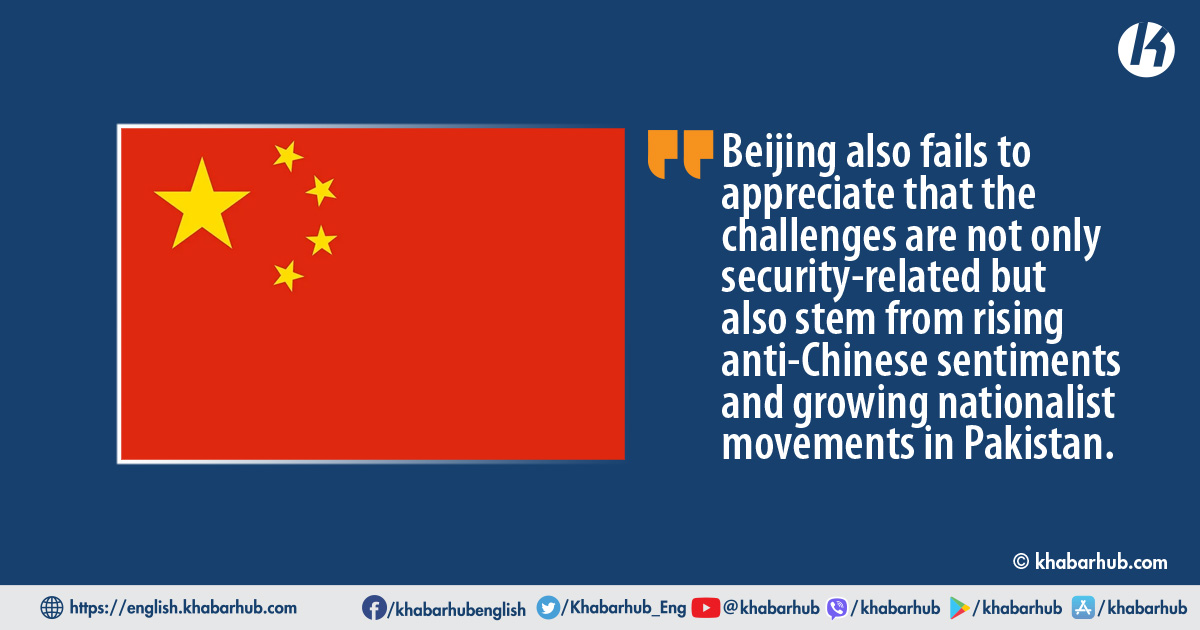The recently concluded visit of Pakistan’s caretaker Prime Minister Anwarul Kakar to China seems to have yielded little progress for projects under the China Pakistan Economic Corridor (CPEC).
It is widely acknowledged now that the grand infrastructure initiative launched with much fanfare in 2015 has lost much of the steam.
The bouquet of projects under Belt and Road initiative (BRI) was claimed to be dedicated towards boosting infrastructure, energy, and economic development in Pakistan.
However, economic slowdown in China along with Pakistan’s ongoing financial crisis and its inability to secure infrastructure loans, have created challenges.
The last few years have witnessed many obstacles; leading to a slowdown in joint projects. China is believed to be turning town new proposals due to concerns over political instability and worsening security conditions in Pakistan.
During the 11th meeting of JCC (primary decision-making body for CPEC) held in 2022, Chinese officials reportedly declined Pakistan’s suggestions to expand the scope of the project umbrella.
The mounting resentment in Balochistan and Gilgit-Baltistan indicate the impact of Chinese expansion and exploitation in garb of CPEC projects.
Despite public expressions of intent to revitalize CPEC from both China and Pakistan, several factors continue to place roadblocks.
These include lack of streamlined business processes for Chinese investors, visa and security obstacles for Chinese professionals, and setbacks in the energy sector, including the rising circular debt.
Among them, the security risk faced by Chinese companies and workers has emerged as the most problematic issue.
Several militant attacks and bombings targeting Chinese engineers and workers have turned into a security nightmare during the last few years.
Beijing is increasingly worried about the expanding array of threats in Pakistan, including Baloch insurgents, the Pakistani Taliban, and the Islamic StateKhorasan province.
The attacks have delayed projects and deterred Chinese nationals from working in certain areas.
In response, China is considering the deployment of People’s Liberation Army (PLA) contingents in Balochistan and Gilgit-Baltistan to ensure security.
Recent years have seen major attacks at a Confucius Institute in Karachi in 2022 and a hotel hosting a senior Chinese delegation in Baluchistan in 2021.
The incidents are straining diplomatic ties between the two countries having a strategic partnership.
China has been issuing stern warnings to Pakistan, stating that future terrorist attacks on Chinese nationals working on CPEC projects could jeopardize their “all-weather friendship.”
After Pakistan’s Prime Minister Shehbaz Sharif’s visit to China in November 2022, an official statement from Beijing emphasized President Xi’s “great concern about the safety of Chinese nationals in Pakistan.”
Moreover, during the meetings between military leaderships of both countries, Pakistan was reminded of the potential consequences for the close relationship if it fails to protect Chinese interests.
A clear message on the issue was delivered to Pak Army Chief Gen Asim Munir and ISI Chief Lt. Gen. Nadeem Anjum during their visits to China in April 2023.
Beijing appears increasingly worried that the security setbacks and delays in CPEC project could tarnish the image of the Belt and Road Initiative (BRI) and negatively affect China’s global reputation.
Further, security risks are making other foreign investors including Pakistan’s Middle Eastern allies hesitant to fund CPEC projects.
Pakistan’s political leadership has tried to address Chinese concerns through some measures like setting up high-level committees to review security measures and possibly listing the Baloch Liberation Army in the UN Sanctions Committee.
The mounting resentment in Balochistan and Gilgit-Baltistan indicate the impact of Chinese expansion and exploitation in garb of CPEC projects.
Unfortunately, it continues to ignore the local discontent which is adding fuel to the fire of targeted attacks.
Beijing also fails to appreciate that the challenges are not only security-related but also stem from rising anti-Chinese sentiments and growing nationalist movements in Pakistan.
The mounting resentment in Balochistan and Gilgit-Baltistan indicate the impact of Chinese expansion and exploitation in garb of CPEC projects.
In Balochistan, the separatist forces accuse China of exploiting natural resources without benefiting the province adequately.
This rejection of new projects highlights China’s concerns regarding the stability and security of its investments in Pakistan.
Overall, the issues hampering investment flows indicate a gradual decline in Beijing’s confidence in Islamabad.
With Pakistan’s worsening economic crisis and China’s own economic slowdown, expectations of benefits from CPEC have also come down.
This is another indicator of China’s BRI ambitions going through a reality check around the globe.









Comment